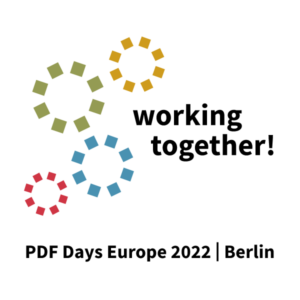PDF Days 2022 – Outlook Topic Block 3: Technology
Here you will find an overview of the planned upcoming contributions at the PDF Days 2022 in Berlin, which are organised by the PDF Association.
The workshops and presentations at the event have already been divided into three thematic blocks in preparation. This means that visitors can easily find their way around and select the appropriate topics.
This year, the three thematic blocks are: practical experience, implementation and technology
Here you will find all the contributions that are currently planned for the technology area. This series of topics is aimed primarily at PDF developers and all those who would like to delve a little deeper into technology. In addition to accessibility, PDF forms and signatures, strategies for testing or PDF compression and optimisation techniques will be discussed. This topic block is also characterised by practical examples and is intended to show how typical problems or errors arise and can also be solved.
Block 3: Technology
- Important topic for PDF developers prepared by Michael Demey: Strategies for testing PDF files.
- Alignment of PDF 1.7 and 2.0 through ISO 32005 and what this means for reflow, reuse and accessibility – A journey through modern tagging. Matthew Hardy, as ISO project leader, introduces the concept that was developed together with the PDF Association. ISO 32005 is a new WG9 technical standard that aims to align and unify the tag set capabilities of PDF 1.7 and PDF 2.0. This is particularly exciting because this new standard supports modern accessibility and enables functions such as derivation and content extraction.
- Another presentation by Michael Demey entitled “the PDF Detectives”: typical errors will be highlighted using practical examples. A presentation from the perspective of PDF developers.
- “Putting a squeeze on your PDF” – Maksim Bezrukov: Techniques for reducing PDF file size and the effects on document content. Get an overview of the different PDF compression and optimisation techniques.
- More concrete practical examples – “PDF Optimisation horror-stories”: Patrick Gallotvividly shows what happens when proper document sizing goes wrong.
- “New Clay” by Joris Schellekens: An exciting article that looks at PDF from a different angle. This is about the unusual sides of the PDF specification: 3D annotations, film, sound, JavaScript, Escape Room-like PDF documents from embedded files, password protection and much more.
- Further contribution by Patrick Gallot: Unlocking the audio and video potential of RichMedia – Critical problem analysis and improvement approaches for the use of audio and video RichMedia content.
- Presentation by Dr. Vladislav Mladenov and Simon Rohlmann on PDF Signature Security: Novel attacks have been devised that lead to critical vulnerabilities in all PDF viewers, especially Adobe, Foxit and LibreOffice. This talk will provide an overview of the attacks related to digital signatures and what techniques exist to bypass integrity protection and manipulate signed content without detection.
- Interoperable document-based signatures with Roman Toda: Important and exciting topic for all PDF developers who design and implement digital document workflows. It is about experiences with the development and implementation of truly interoperable electronic signature workflows. It will show how workflow information can be embedded in an interoperable way, how a trusted audit trail can be generated and embedded, while allowing vendors to make specific business decisions.
- Topic PDF Forms: Contribution by John Brinkman, providing an overview of the progress of the forms technical working group. The presentation explains the rationale for these necessary updates and changes and summarises proposed solutions.
- Matthias Valvekens presents ideas for interoperable self-updating PDF documents. The question is raised as to what an interoperable versioning and updating mechanism for PDF might look like, since one criticism of PDF is that the user cannot readily see whether the document is up-to-date when viewing a PDF document.
Note: The lectures will be held in English
Everything about the schedule and registration can be found here: https://www.pdfa.org/announcing-the-pdf-days-europe-2022-agenda/
The complete event schedule can be found here: https://www.pdfa.org/agenda/pdf-days-europe-2022/
Would you like to take a deeper technical dive into PDF technology? Find out more about the Technical Workshop 2022 here:
More on the Deep Technical Workshop with Peter Wyatt
Led by ISO 32000 Project Leader, PDF Association CTO and DARPA SafeDocs Principal Investigator Peter Wyatt, the PDF Association’s Deep Technical Workshop offers a unique opportunity for library and application developers, computer scientists and technology researchers to engage in in-depth discussions with the independent PDF technology expert who developed the Arlington PDF Model, manages errata for the PDF specification and plays a number of key roles in shaping the future of the PDF format.
The Deep Technical Workshop will take place in Berlin on 8 and 9 September. The venue is the same hotel as PDF Days Europe 2022 on the following Monday and Tuesday, 12 and 13 September.
The Deep Technical Workshop is aimed at software developers, software team leaders, technical support staff and other experts responsible for PDF software technologies. Existing knowledge of PDF specifications is required, as is experience in developing PDF parsers, renderers, viewers or PDF writers. Basic programming skills and the use of command line programs are assumed. Participants should bring their laptops to create and explore PDFs and familiarise themselves with the information, resources and tools presented.
https://www.pdfa.org/agenda/pdf-days-europe-2022-deep-technical-workshop/
Click here for topic block 1 – Practical experience
Click here for topic block 2 – Implementation

